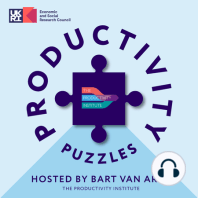2 min listen
New business formation and productivity
ratings:
Length:
50 minutes
Released:
Mar 23, 2022
Format:
Podcast episode
Description
Why do we need new firms? How important is business creation for employment and productivity? How has the coronavirus pandemic affected the churning of businesses? In this episode of Productivity Puzzles, we discuss business dynamism, which is about the birth, growth and decline of businesses, also called churning. The evidence shows that churning is good for the creation of new jobs, for providing opportunities for firm, industries and regions to invest and grow, and a key driver of productivity.
Recent ONS data also shows that while older firms in the UK are the most productive, it’s the newer ones that show the fastest growth in productivity. But there are differences in business dynamics across industries, and also differences across regions. We look at how the business environment needs to change and what policies need to be put in place to see more new firm creation and what is needed to help them grow and become more productive.
Host Bart van Ark is joined by:
Anthony Impey, CEO of Be The Business, an independent not-for-profit organisation helping small and medium sized businesses (SMEs) boost their performanceClare Elsby, Head of People and Culture at Elsby & Co, an accountancy firm specialised in the SME market. Jakob Schneebacher from the Office for National Statistics
Publications mentioned in the podcast
Spotlight on Innovation, FSB Policy Report July 2018 How Government can unlock small business productivity ONS: Firm-level labour productivity measures from the Annual Business Survey, UK: 1998 to 2019
For more information on the topic:
ONS, Business demography, UK: 2020; Change in the number of UK businesses broken down by district and industryA. Duncan et al., Trough to Boom: UK firm creation during the COVID-19 pandemic, NIESR, May 2021B. Nasbitt, Firm Creation, Geography and Productivity, in Covid-19 and Productivity: Impact and Implications, Section 7, pp. 88-105
About Productivity Puzzles:
Productivity Puzzles is sponsored by Capita and brought to you by The Productivity Institute, a research body involving nine academic institutions across the UK, eight Regional Productivity Forums throughout the nation, and a national independent Productivity Commission to advise policy makers at all levels of government. It’s funded by the Economic and Social Research Council.
Recent ONS data also shows that while older firms in the UK are the most productive, it’s the newer ones that show the fastest growth in productivity. But there are differences in business dynamics across industries, and also differences across regions. We look at how the business environment needs to change and what policies need to be put in place to see more new firm creation and what is needed to help them grow and become more productive.
Host Bart van Ark is joined by:
Anthony Impey, CEO of Be The Business, an independent not-for-profit organisation helping small and medium sized businesses (SMEs) boost their performanceClare Elsby, Head of People and Culture at Elsby & Co, an accountancy firm specialised in the SME market. Jakob Schneebacher from the Office for National Statistics
Publications mentioned in the podcast
Spotlight on Innovation, FSB Policy Report July 2018 How Government can unlock small business productivity ONS: Firm-level labour productivity measures from the Annual Business Survey, UK: 1998 to 2019
For more information on the topic:
ONS, Business demography, UK: 2020; Change in the number of UK businesses broken down by district and industryA. Duncan et al., Trough to Boom: UK firm creation during the COVID-19 pandemic, NIESR, May 2021B. Nasbitt, Firm Creation, Geography and Productivity, in Covid-19 and Productivity: Impact and Implications, Section 7, pp. 88-105
About Productivity Puzzles:
Productivity Puzzles is sponsored by Capita and brought to you by The Productivity Institute, a research body involving nine academic institutions across the UK, eight Regional Productivity Forums throughout the nation, and a national independent Productivity Commission to advise policy makers at all levels of government. It’s funded by the Economic and Social Research Council.
Released:
Mar 23, 2022
Format:
Podcast episode
Titles in the series (34)
Welcome to Productivity Puzzles by Productivity Puzzles
